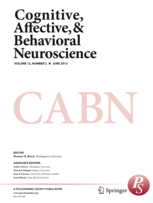 | |
| Discipline | Cognitive neuroscience |
|---|---|
| Language | English |
| Edited by | Diego A. Pizzagalli, Harvard Medical School |
| Publication details | |
Former name | Psychobiology |
| History | 1973–2000 as Psychobiology/Physiological Psychology 2001-Present as Cognitive, Affective & Behavioral Neuroscience |
| Publisher | Springer Science+Business Media on behalf of the Psychonomic Society |
| Frequency | 5/year (Feb, Apr, Jun, Aug, Oct) |
| 3.526 (2021) | |
| Standard abbreviations | |
| ISO 4 | Cogn. Affect. Behav. Neurosci. |
| Indexing | |
| CODEN | CABNC2 |
| ISSN | 1530-7026 (print) 1531-135X (web) |
| LCCN | 00214924 |
| OCLC no. | 44447951 |
Psychobiology | |
| ISSN | 0889-6313 |
| Links | |
Cognitive, Affective, & Behavioral Neuroscience is peer-reviewed scientific journal covering research on behavior and brain processes in humans. It was established in 1973 as Psychobiology and received its current title in 2001, with volume numbering restarting at 1. [1] The journal is published by Springer Science+Business Media on behalf of the Psychonomic Society and the editor-in-chief is Diego A. Pizzagalli (Harvard Medical School).